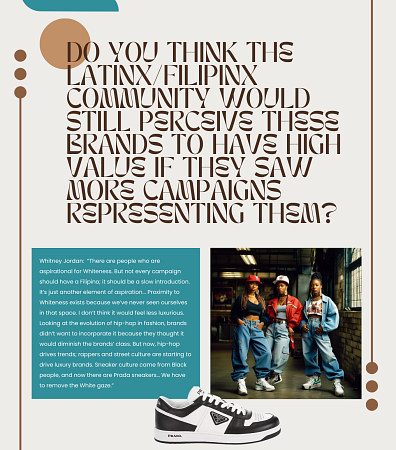
Carmelli Hess, BA '23, MA '24, was scrolling through Instagram one day when she noticed something odd.
“There was practically zero Latinx representation,” Hess said. “That surprised me because the U.S. has retained its position as the luxury fashion industry's largest market, and the Latinx community is its fastest-growing minority.”
So Hess, a master’s student at the UO School of Journalism and Communication (SOJC) decided to write a white paper on how brands can authentically represent the Latinx and Filipinx communities in their advertising campaigns. That guide became her Advertising and Brand Responsibility (ABR) Master's capstone project, which earned her the Outstanding ABR Project Award for 2023-24.
Hess, who is half-Filipina, interviewed 49 people, including Filipinx and Latinx members of the fashion industry as well as consumers, about representation in the industry. She found that even when Latinx or Filipinx people were represented, the portrayals were often harmful stereotypes or encouraged cultural appropriation by white consumers.
“I’ve always been interested in fashion,” Hess said. “I’m passionate about branding, and that’s what these luxury brands are so good at,” she says. “When I noticed that lack of representation, I was surprised. I grew up seeing my own family and my Latinx friends love luxury brands. Why weren’t these brands speaking to us?”

Hess recommends that brands think about inclusion from the beginning of a campaign instead of ticking a diversity box at the end. They should tell real, nuanced stories and not portray the brand as a hero or savior to the underrepresented community.
“There will always be a higher class of people seeking high quality and exclusivity from brands, but it does not have to alienate people outside of that coterie,” Hess wrote in her project. “It can instead be geared toward uplift, social responsibility and cultural competence.”
—By Jennifer Snelling
Jennifer Snelling is a Eugene-based education journalist. She graduated from the SOJC with a master’s degree in journalism in 2001.
